
Gelechioidea is the superfamily of moths that contains the case-bearers, twirler moths, and relatives, also simply called curved-horn moths or gelechioid moths. It is a large and poorly understood '"micromoth" superfamily, constituting one of the basal lineages of the Ditrysia.

Tenthredinidae is the largest family of sawflies, with well over 7,500 species worldwide, divided into 430 genera. Larvae are herbivores and typically feed on the foliage of trees and shrubs, with occasional exceptions that are leaf miners, stem borers, or gall makers. The larvae of externally feeding species resemble small caterpillars. As with all hymenopterans, common sawflies undergo complete metamorphosis.
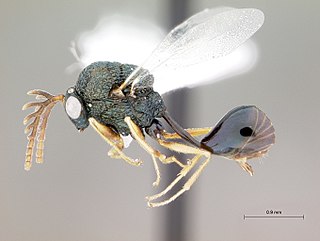
The Eucharitidae are a family of parasitic wasps. Eucharitid wasps are members of the superfamily Chalcidoidea and consist of three subfamilies: Oraseminae, Eucharitinae, and Gollumiellinae. Most of the 55 genera and 417 species of Eucharitidae are members of the subfamilies Oraseminae and Eucharitinae, and are found in tropical regions of the world.

Cypraeidae, commonly named the cowries, is a taxonomic family of small to large sea snails. These are marine gastropod mollusks in the superfamily Cypraeoidea, the cowries and cowry allies.
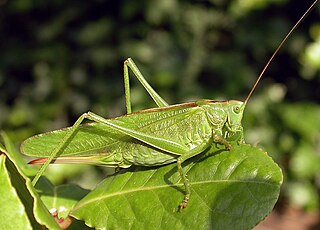
The Tettigoniinae are a subfamily of bush crickets or katydids, which contains hundreds of species in about twelve tribes.

Tetrigidae is an ancient family in the order Orthoptera, which also includes similar families such as crickets, grasshoppers, and their allies. Species within the Tetrigidae are variously called groundhoppers, pygmy grasshoppers, pygmy devils or "grouse locusts".

Spilomelinae is a very species-rich subfamily of the lepidopteran family Crambidae, the crambid snout moths. With 4,135 described species in 344 genera worldwide, it is the most speciose group among pyraloids.

Planorbidae, common name the ramshorn snails or ram's horn snails, is a family of air-breathing freshwater snails, aquatic pulmonate gastropod molluscs. Unlike most molluscs, the blood of ram's horn snails contains iron-based hemoglobin instead of copper-based hemocyanin. As a result, planorbids are able to breathe oxygen more efficiently than other molluscs. The presence of hemoglobin gives the body a reddish colour. This is especially apparent in albino animals.

Neritidae, common name the nerites, is a taxonomic family of small to medium-sized saltwater and freshwater snails which have a gill and a distinctive operculum. The family Neritidae includes marine genera such as Nerita, marine and freshwater genera such as Neritina, and freshwater and brackish water genera such as Theodoxus.
Pupina is a genus of land snails with an operculum, terrestrial gastropod molluscs in the subfamily Pupillinae of the family Pupinidae.
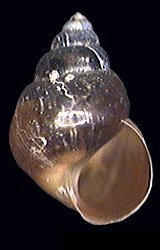
Assimineidae is a family of minute snails, also known as palmleaf snails, with an operculum, gastropod mollusks or micromollusks in the superfamily Rissoidae. Many of these very small snails live in intermediate habitats, being amphibious between saltwater and land; others live in freshwater.

Sterrhinae is a large subfamily of geometer moths with some 3,000 described species, with more than half belonging to the taxonomically difficult, very diverse genera, Idaea and Scopula. This subfamily was described by Edward Meyrick in 1892. They are the most diverse in the tropics with the number of species decreasing with increasing latitude and elevation.
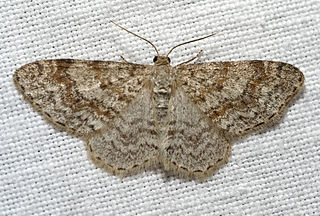
Asthenini is a tribe of geometer moths under subfamily Larentiinae first described by Warren in 1893. The tribe has been combined with Eupitheciini in the past, most notably by Jeremy Daniel Holloway in his work The Moths of Borneo.

Diplodocinae is an extinct subfamily of diplodocid sauropods that existed from the Late Jurassic to Early Cretaceous of North America, Europe, Africa and South America, about 161.2 to 136.4 million years ago. Genera within the subfamily include Tornieria, Supersaurus, Leinkupal, Galeamopus, Diplodocus, and Barosaurus.
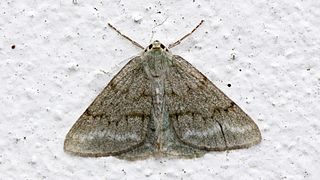
The Pseudoterpnini are a tribe of geometer moths in the subfamily Geometrinae. The tribe was described by Warren in 1893. It was alternatively treated as subtribe Pseudoterpniti by Jeremy Daniel Holloway in 1996.
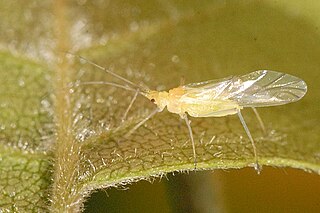
Calaphidinae is a subfamily of aphids in the family Aphididae. There are more than 60 genera and 360 described species in Calaphidinae.
The Rhynchocystinae are a subfamily of parasites in the phylum Apicomplexa.

Blennocampinae is a subfamily of common sawflies in the family Tenthredinidae. There are more than 100 genera and 600 described species in Blennocampinae.

Perreyiinae is a subfamily of sawflies in the family Pergidae. There are about 16 genera and more than 90 described species in Perreyiinae.
Adianthidae is an extinct family of litopterns that existed from the Middle Eocene (Mustersan) to the Early Miocene (Santacrucian).

















